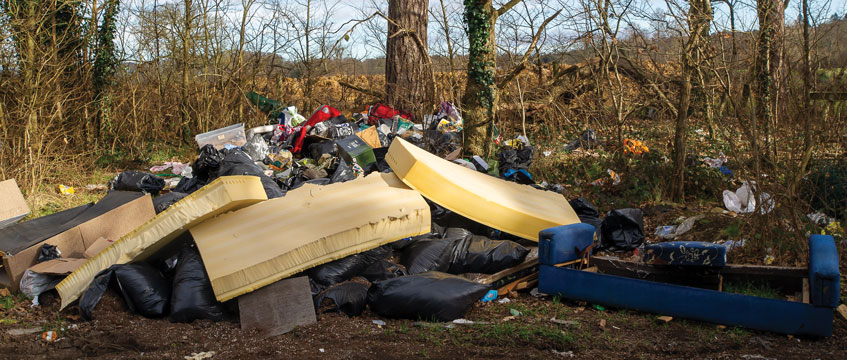On 31 January the BBC One current affairs programme Disclosure aired “Dirty Business”, which focused on the increasing severity of criminal waste activities in Scotland from small fly-tipping incidents involving a “man with a van” to fly-tipping on a huge scale involving organised crime gangs. These activities are turning rural areas of Scotland into vast illegal landfill sites.
Organised crime gangs now see fly-tipping as a way to make money by avoiding landfill tax duty. That, together with regulators being under-resourced to tackle the problem, means it looks like fly-tipping is only set to get worse, and not just for Scotland. England and Wales are also facing significant problems with fly-tipping – in England alone in 2020/21, local authorities dealt with 1.3m fly-tipping incidents.
Fly-tipping blights communities and precious landscapes, causes pollution of the environment and harm to human health. In addition, the cost of removing fly-tipped waste material each year is extortionate. The total clean-up costs in England in 2020 were estimated to be £100m, with local authorities picking up £44m.
Fly-tipping in England is a criminal offence under section 33 of the Environmental Protection Act 1990 and is described as the “illegal disposal of household, industrial, commercial or other ‘controlled’ waste”. The materials being dumped are mainly household waste, but hazardous waste involving chemicals and medical items is often seen. There is also an associated criminal offence relating to the unlawful deposit of waste from a motor vehicle.
Whose responsibility is it to clean it up?
Local authorities, Crown authorities, designated statutory undertakers, governing bodies of designated educational institutions and the Highways Agency have legal obligations under section 89 of the 1990 Act to keep land under their control clear of litter refuse and detritus. However, they are only responsible for land that is under “their control” and fly-tipping that occurs on private land will fall to the responsibility of the landowner/land manager/tenant to pay for its lawful removal.
If the fly-tipped material, which can range from a small amount of household waste to thousands of tonnes of chemical, medical and other wastes, is not removed by the person responsible for the land then the local authority and the Environment Agency can step in and use their powers to compel owners to clear waste from their land.
Failure to comply with the requirements of a notice issued for the removal of the waste may result in a criminal offence being committed, with the risk of fixed-penalty notices being issued or, in a worst-case scenario, resulting in a prosecution.
Both local authorities and the Environment Agency have powers to enter land and remove the waste material and can seek reimbursement for costs they have incurred. However, they will only do so if the waste material is causing significant harm to the environment and/or human health.
Local authorities can use section 215 of the Town and Country Planning Act 1990 (as amended) to issue a notice to landowners requiring land or buildings to be cleaned up if their condition “adversely affects the amenity of the area”.
Derelict buildings are also used by fly-tippers to dispose of waste. Media reports highlight fake waste companies – particularly around Manchester and Birmingham – hiring buildings, dumping waste in them and then disappearing, leaving the landowner to pick up the cost.
Action can also be taken against landowners by local authorities under the statutory nuisance regime provided by sections 79 and 80 of 1990 Act (as amended). The Act provides that statutory nuisance can include odours, accumulations or deposits that “must be or be likely to become, prejudicial to people’s health or interfere with a person’s legitimate use and enjoyment of land”. Local authorities have a duty to investigate complaints about statutory nuisance and can serve an abatement notice on an occupier. Failure to comply with a notice can result in a fine of up to £5,000, with a further fine of up to £500 for each day on which the offence continues after conviction.
Due to the impact fly-tipping is having on the rural community, the National Farmers’ Union is calling for a change in the law so that private landowners are not solely responsible for the cost of clearing it up.
The Country Land & Business Association has published a “five-point plan” for tackling fly-tipping, with part of its campaign including giving landowners an exemption from paying landfill tax when clearing fly-tipped waste that they did not “knowingly cause or knowingly permit” to be deposited.
What can landowners do?
The National Fly-tipping Prevention Group has some good tips for actions that landowners can take to try to prevent them becoming a victim of fly-tipping. For example:
- install gates and barriers;
- improve visibility;
- install lighting, CCTV and signage;
- remove any fly-tipped waste quickly so that it does not become a dumping ground for other fly-tippers; and
- communicate with local businesses and neighbours as well as the local community police officer.
There are limited legal measures available to landowners:
- private prosecution under the 1990 Act if the culprit is known; and
- apply for an injunction if there are continuing serious issues with fly-tipping and preventative measures taken by the landowner have been ineffective.
Despite best efforts to tackle the problem, unless more resources are invested to prevent this crime, the burden on landowners looks likely to increase.
Jill Crawford is a senior associate in the planning and environment team at Irwin Mitchell











